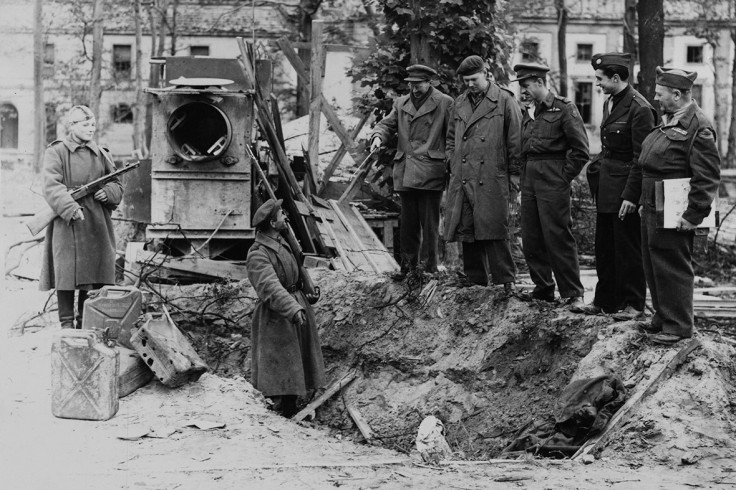VE Day: Allies' Denazification programme was a masterstroke - shame George Bush ignored it in Iraq

We look back now and it seems that Hitler's death inevitably meant the end of Nazi Germany. But it wasn't like that at all. Hitler's death didn't kill off Nazi Germany, and in fact there was a big expectation at the time, based on the fanaticism of the Nazis, that the movement would go on, that we'd be fighting a guerrilla war in the streets of Berlin.
Yet nothing of the sort happened. The wind was taken completely out of the Nazi sails, and victory was secured within days. The main reason for that is the brilliance of the Allies' Denazification strategy, which should have provided a template for all future post-conflict strategies, yet was completely ignored by George Bush in Iraq, with calamitous consequences.
The Allies had been planning what to do once they arrived in Germany for years. So when we arrived, there was a clear strategy. And the strategy was designed to ensure the society could carry on, and not collapse as it had after the First World War.
We didn't just chuck every Nazi out of office. Low-level members of the party, who held important roles in the German bureaucracy, were kept on. That was a shrewd move, a brilliant move. Yes the Allies knew about Auschwitz and the other camps by this stage, but they also knew it was important to keep the country moving, otherwise the agony of Nazism might have been prolonged.
This produced some farcical situations. I interviewed one guy on the Danish border who kept arresting this one particular Nazi, only to see the man released and sent back to him again and again. Eventually my interviewee was told, in no uncertain terms, not to arrest this man because he was tax inspector for the district of Flensburg, and he was essential.
We didn't just chuck every Nazi out of office. Low-level members of the party, who held important roles in the German bureaucracy, were kept on. That was a brilliant move. Yes the Allies knew about Auschwitz and the other camps by this stage, but they also knew it was important to keep the country moving, otherwise the agony of Nazism might have been prolonged.
Yet there was also some real heroism, as Allied soldiers pitched in to help ensure the key mechanisms of society were maintained. For example one British army officer actually took over the VW works in Berlin, and made them work again to ensure people had an income and something to do; no-one wanted a return to the sort of unemployment and social collapse which had brought the Nazis to power.
While preserving the civil structure, the Allies completely dismantled the military structure. The Germans weren't able to retain their army, as they had after the Great War. At the end of that conflict, a general called Ivor Maxse said that the Germans had made a God of their army and there was no point trying to create democracy in the country until that army had been destroyed.
The Allies took that advice on board; if you look at the record books, no German regiment has a history beyond 1946. Letting them off the hook in World War 1 had allowed the cultivation of a mythology which fuelled the Nazi rise to power. By disbanding the German army, we prevented that from happening again.
With this careful two-pronged strategy, the Allies ensured that German people complied with them. You saw things like housewives making clothes, people building houses. There was no descent into anarchy; society remained disciplined. Of course later on the Marshall Plan, with its millions of dollars of free money, provided a crucial injection of funds, and played a crucial role in the recovery which enabled West Germany to become an economic powerhouse in Europe.
Given the way Germany stabilised, one would have thought future Allied commanders would have copied it. But perhaps we should have known better than to assume George Bush would do something so rational.
The template was put to Bush in Iraq and he rejected it. Everyone in the Baath party was thrown out, right down to the people who ran the sewage works. Even senior police officers were removed because they were part of Saddam Hussein's Baath party.
Everyone knows the damage this did to Iraq; Bush's foolhardy policy threw the country into chaos, and sowed the seeds of guerrilla warfare, the very thing the Allies had sought to avoid. Perhaps if Bush had heeded the lessons of 60 years earlier, the Iraq war might not be remembered as such a disaster today.

Andy Robertshaw is a freelance military historian and a world-renowned expert on World Wars I and II. He has appeared on several BBC documentaries, including Finding the Fallen, Trench Detectives and First and Last. He also served as an actor and historical advisor on Stephen Spielberg's WWI film Warhorse.
Andy has created his own World War I trench in Charlwood, Surrey where people can experience life in the First World War for themselves. You can find out more about the trench here [The Trench - Andy Robertshaw] or go to www.andyrobertshaw.com to read more about Andy and his work.
© Copyright IBTimes 2025. All rights reserved.





















